Totnes Declares a Climate & Ecological Emergency – What Next? Event report.
By rob hopkins 31st July 2019
On July 13th in Totnes, an event was held which brought together local Transition, XR and other local groups to ask how best to respond to local government ‘climate emergency’ declarations. Rob Hopkins reports on the day, on its learnings, and how you might run your own.
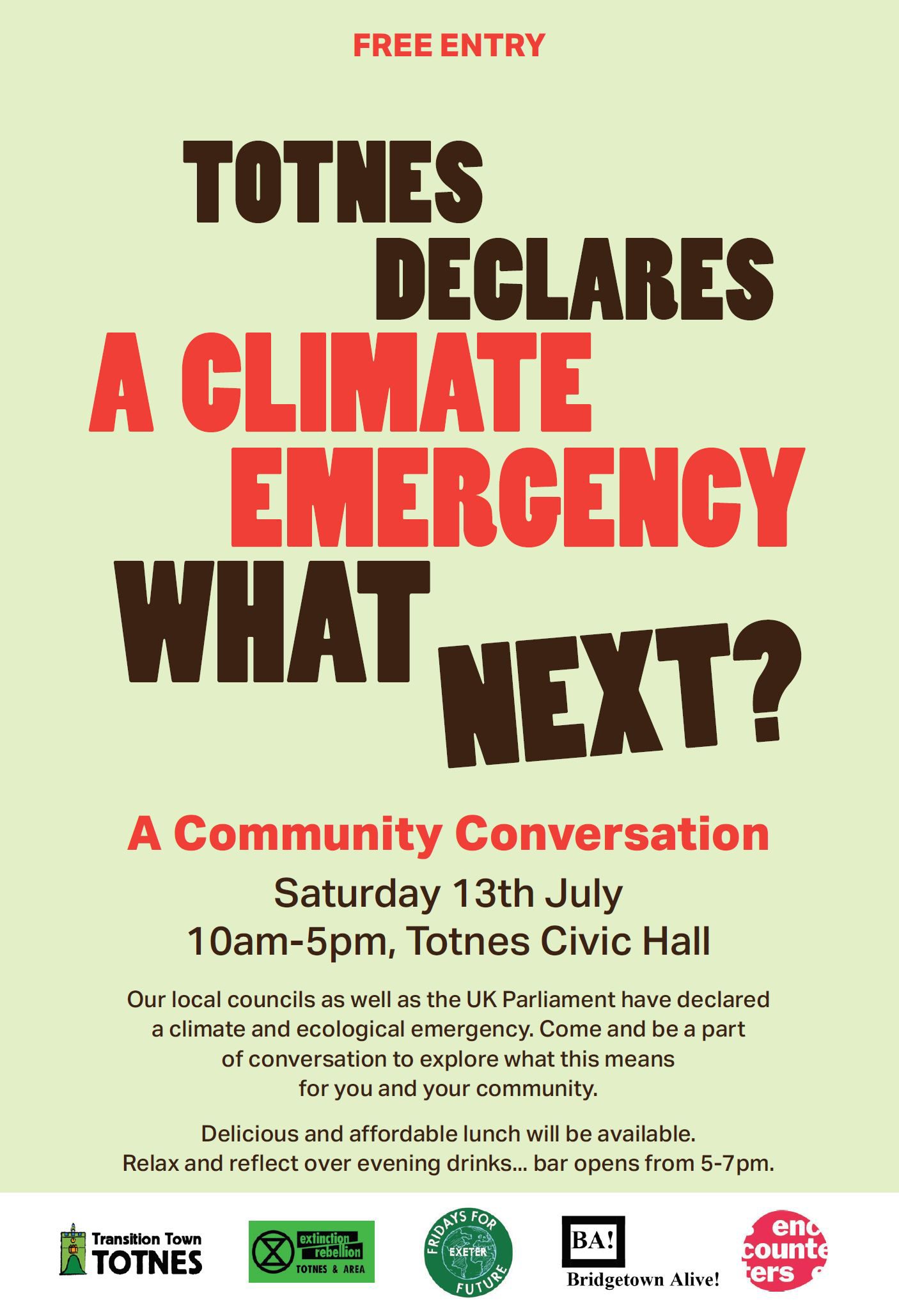 On the day, at Totnes Civic Hall, I was part of facilitating, with Ruth Ben-Tovim, supported by Jenny Gellatly and Rob Shorter, an amazing event called ‘Totnes Declares a Climate and Ecological Emergency – What Next?’ Our town, district and county councils have now all declared climate emergencies, to varying degrees of urgency, and are now trying to figure out what that actually means in practice. In that context, the purpose of the day was to convene a community conversation to begin the process of fleshing out what an appropriate response to the emergency might look like.
On the day, at Totnes Civic Hall, I was part of facilitating, with Ruth Ben-Tovim, supported by Jenny Gellatly and Rob Shorter, an amazing event called ‘Totnes Declares a Climate and Ecological Emergency – What Next?’ Our town, district and county councils have now all declared climate emergencies, to varying degrees of urgency, and are now trying to figure out what that actually means in practice. In that context, the purpose of the day was to convene a community conversation to begin the process of fleshing out what an appropriate response to the emergency might look like.
[You can download a detailed guide to how to facilitate this event here.
The day was co-presented by Transition Town Totnes, Extinction Rebellion Totnes & Area, Encounters Arts, Totnes Town Council, Caring Town Totnes, Bridgetown Alive!, Fridays for Future and others. There were people there from Southampton, Paris and even California to find out how one might run such an event, and people have asked me since, so what follows will hopefully be written in such a way that you could replicate, or adapt it, if you so choose.
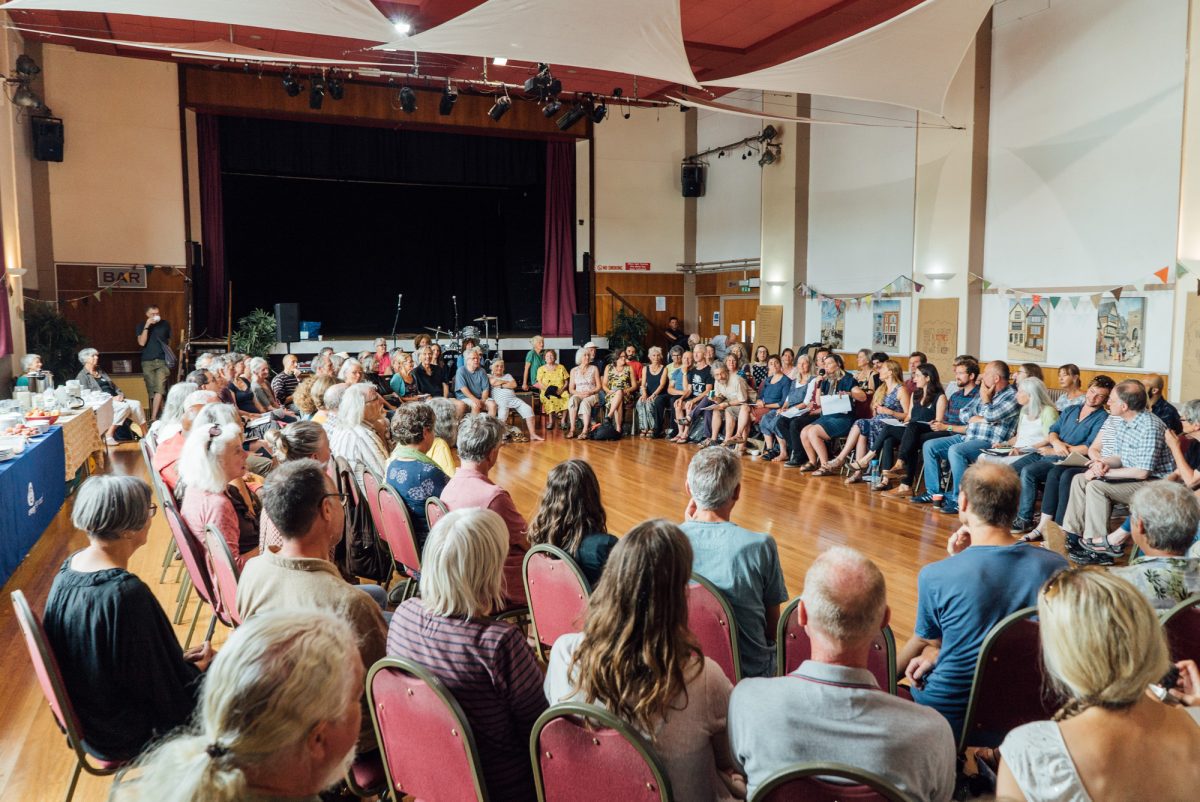
We started at 10:20 with a room with two concentric rings of chairs, and a welcome and introductions, and inviting people to turn to the person next to them to talk about what brought them here and what were their hopes for the day. We had an opening reading by Anna Lopez, one of our local school strikers:
“Let us take a moment, this moment, to consider why we are here.
Let’s recall our love for the whole of humanity, in all corners of the world.
Let’s remember our love for our beautiful planet that feeds, nourishes and sustains all life.
Let’s recollect our sincere desire to protect and restore all this, for now and for generations to come.
As we meet today, may we find the courage to bring this sense of peace and appreciation to everyone we encounter, to every word we speak and to every action we make
In this emergency. Together. Rooted in love. We are all we need and we act as if we are needed
Let us take a moment of Moment of Silence…
After that moment of silence and after Ruth had introduced and given the shape of the day, we did a few activities to get a sense of who is in the room. We asked people to stand up if they were from different places – “Bridgetown”, “the centre of town”, “outlying villages”, “further afield” etc. Then “stand up if you’ve ever” … options then included “been involved in Transition Town”, “been involved in XR”, “been an elected representative”, “felt despair”, “felt optimistic”, “run a local business”, “volunteered”, “grown food” and more…. It was great to get a sense of who had come together with us for this day.
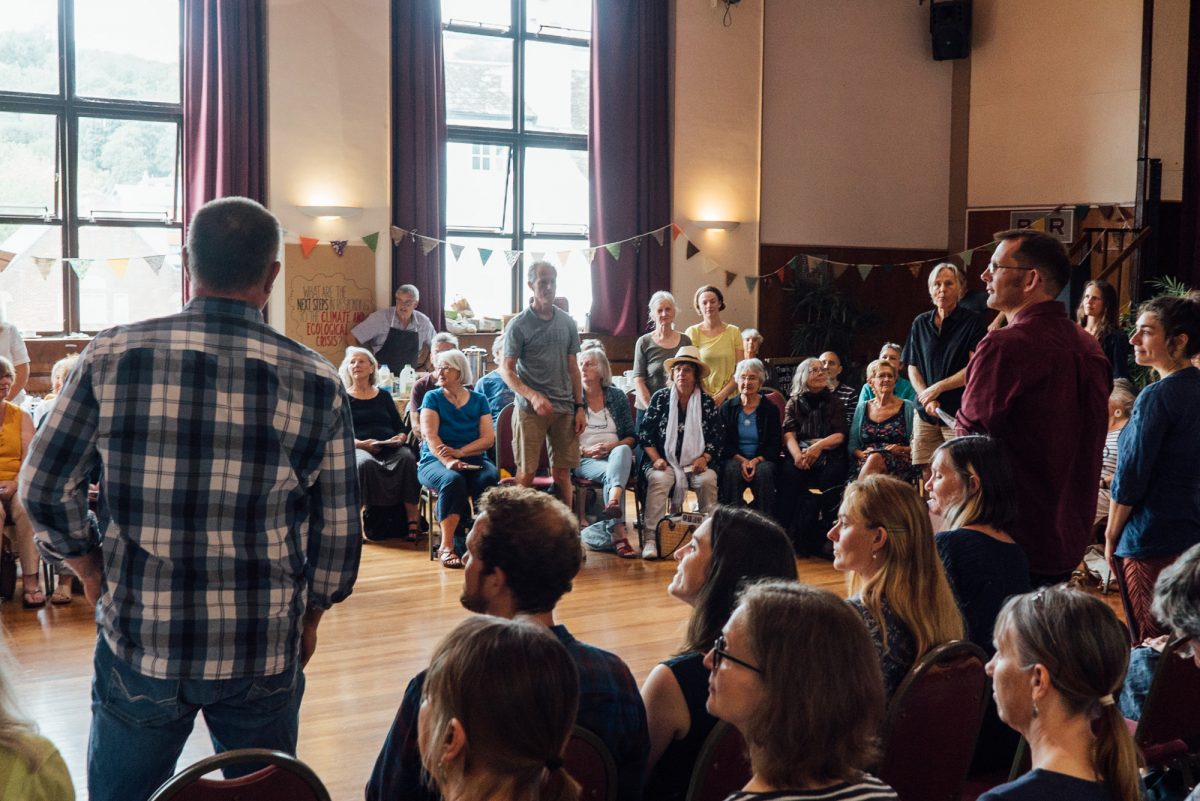
We invited people to ‘mill’ around in the space in the centre of the chairs, then to meet up with a person in front of them to discuss firstly “what’s moving you most right now about the climate/ecological emergency?” They then milled again, and with their second partner asked “what’s inspiring you most about the times we are living in?” Then after a final mill, they discussed the question “what would you like future generations to thank you for personally?”

This was followed by our first round of ‘provocateurs’. Six people from very different perspectives addressed the question
“From your perspective/experience/ sector/viewpoint; What is the emergency we are in? How did we get here? What will it look like if it business continues as usual?”
We heard from school striker Anna Lopez about the realities of being a school striker, how it provides an amazing experience and education, but how it also puts huge strain on to many of the kids involved. “We don’t need your congratulations”, she told the hall, “we need your support”. Saif Ali of Integr8 talked about the experience of uprooted peoples in the world, and how we need to reboost our society’s levels of compassion.
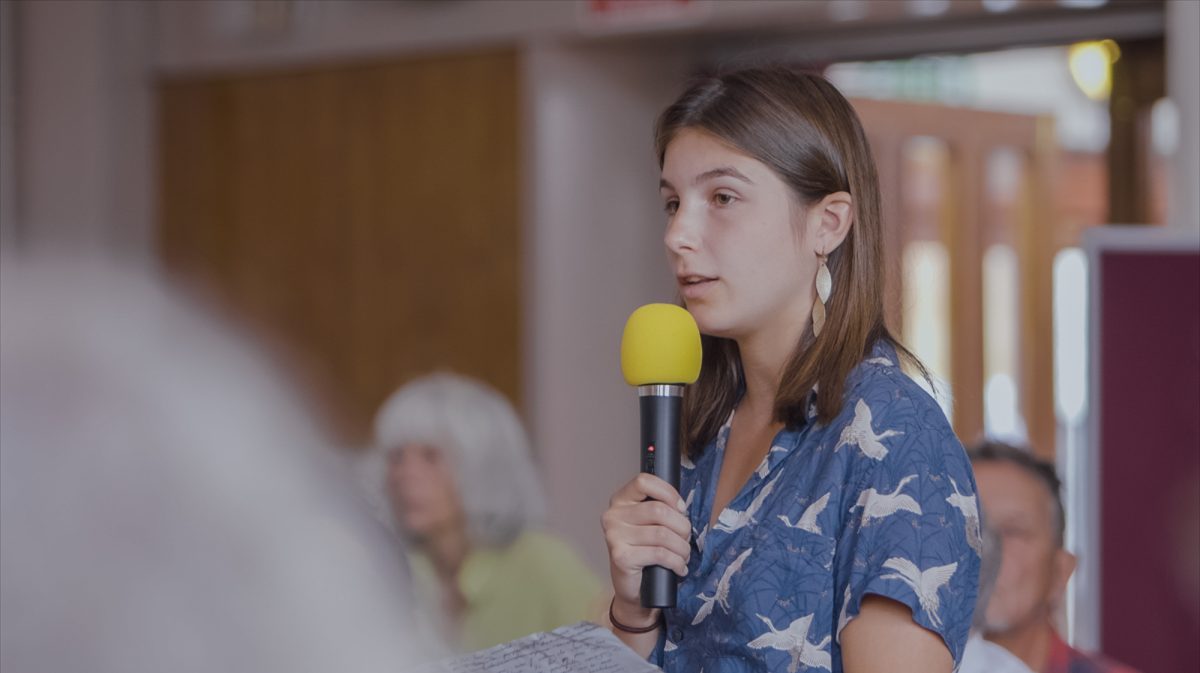
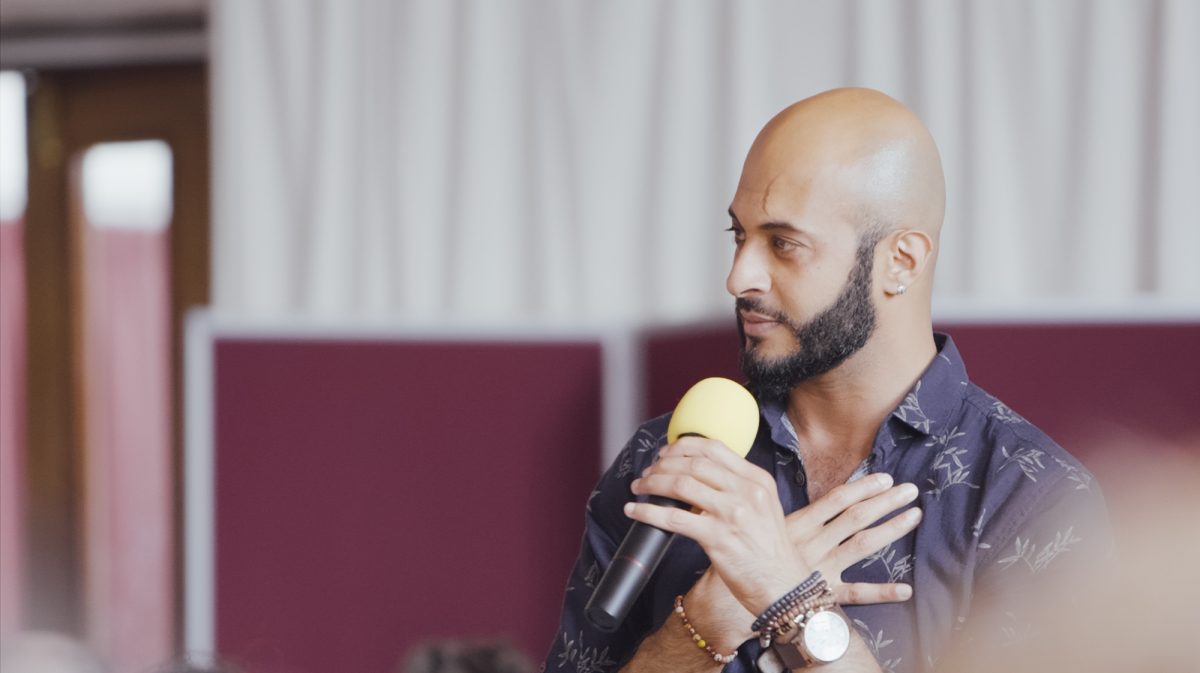
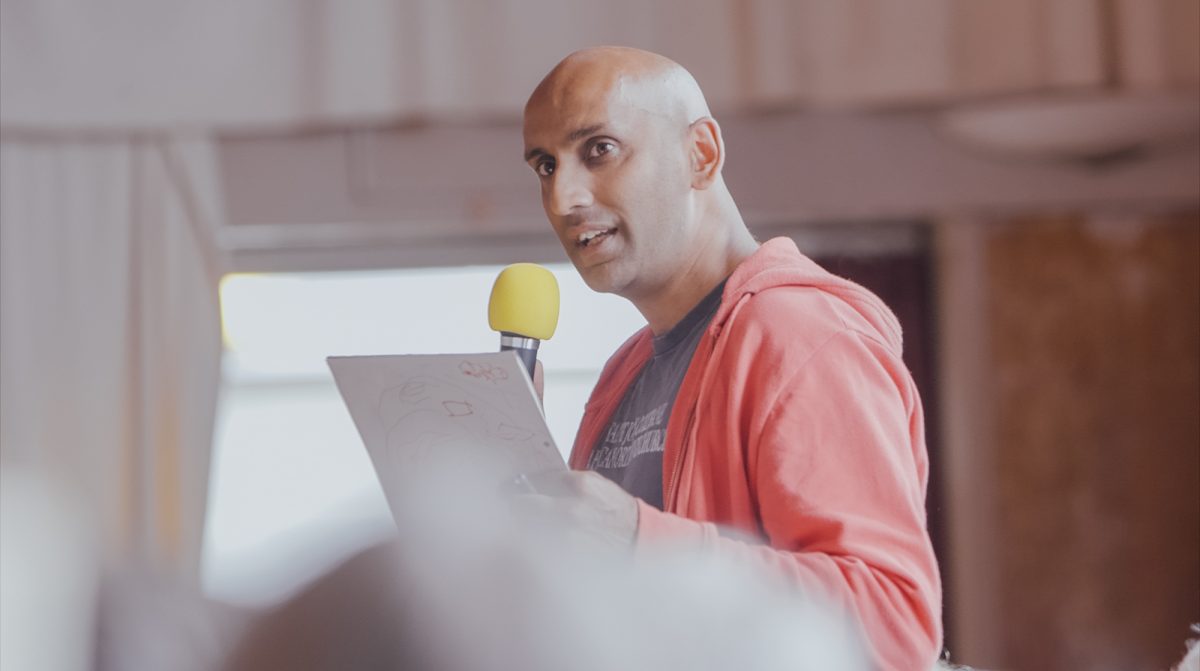
Ash Ghadiali, co-editor of Red Pepper magazine talked about the experience of people of colour and how the idea that there is an emergency is, for many people, not a new one, just that now it has reached such a level that it is being noticed in the ‘bubbles’ of the more privileged. Toni Spencer talked about the inner toll that living in such a time takes on us, living in a time of extinction and collapse. Robin Webster, Senior Climate Change Engagement Strategist at Climate Outreach talked about the realities of the climate science, Dr. Nick Paling from Westcountry Rivers Trust talked about the dangerous complacency in our culture around water and our water systems. Harriet Bell of Dartington Hall Trust talked about food and farming and the urgency of change.
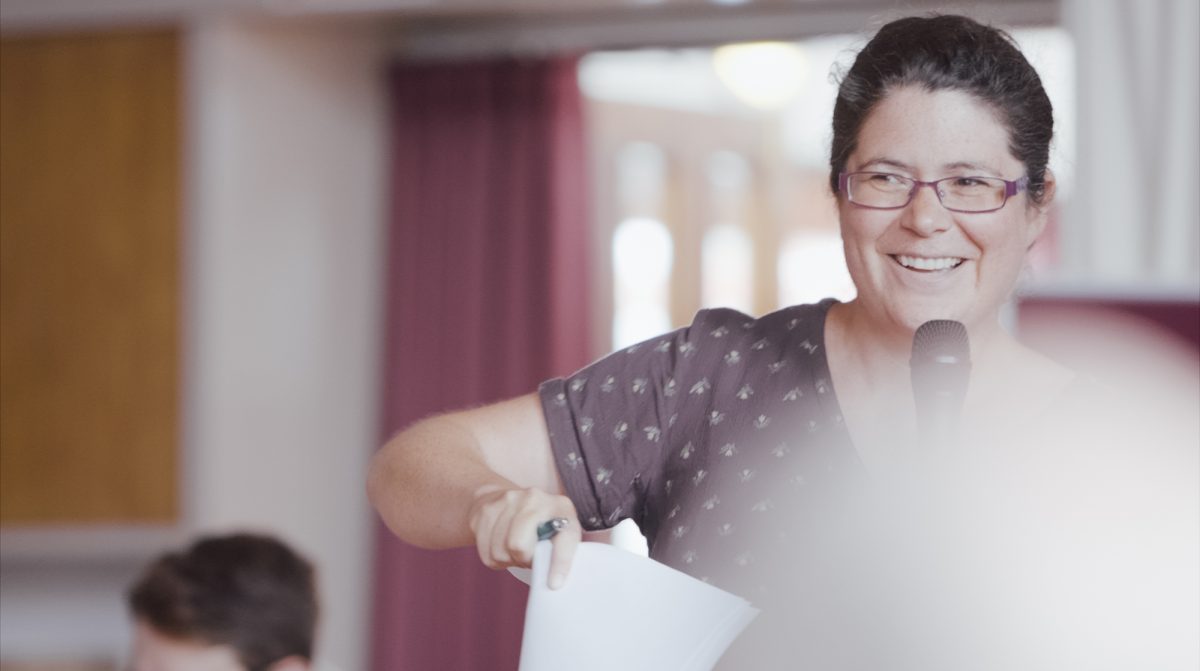
Following the provocations, and as a way of inviting people to digest what they had heard, people were invited to visit one of two tables which were covered in different objects, and to choose one that represented how they were feeling having listened to the provocateurs. They then paired up with another person and talked about what they were feeling, and why they had chosen it.
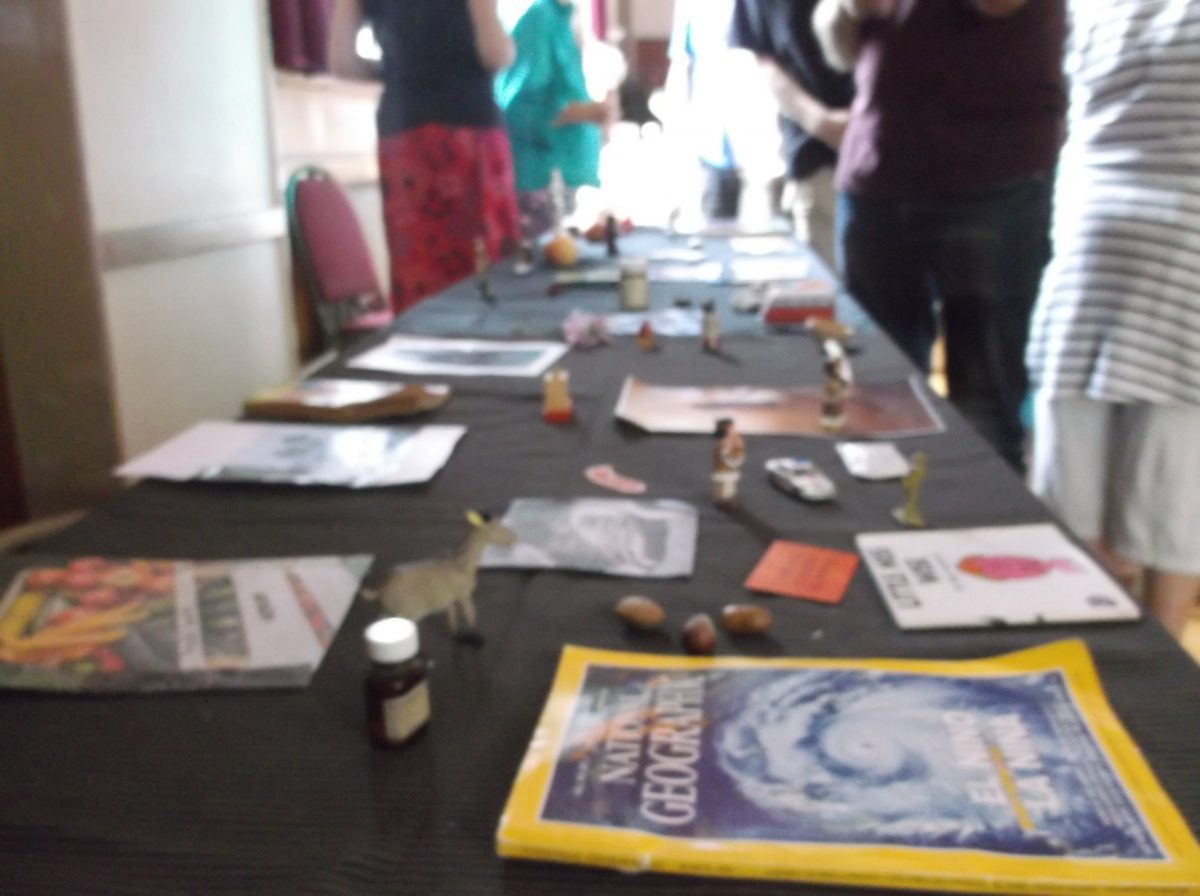
After a break, the second round of provocations explored the question:
“If we do everything we can possibly do in the next 11 years to respond to the climate emergency, working together locally and thinking globally, if we threw all the resources, imagination, courage and political will at it, what could we create?”
Saif Ali spoke about how qualitatively different it would feel to live in a culture where people were welcomed. Robin Webster spoke about how the climate science is urgent but it is still possible to avoid the very worst case scenarios, just. Johnny Gowdy from Regen talked about the potential for a town like Totnes to move to a low carbon, renewables-based economy.
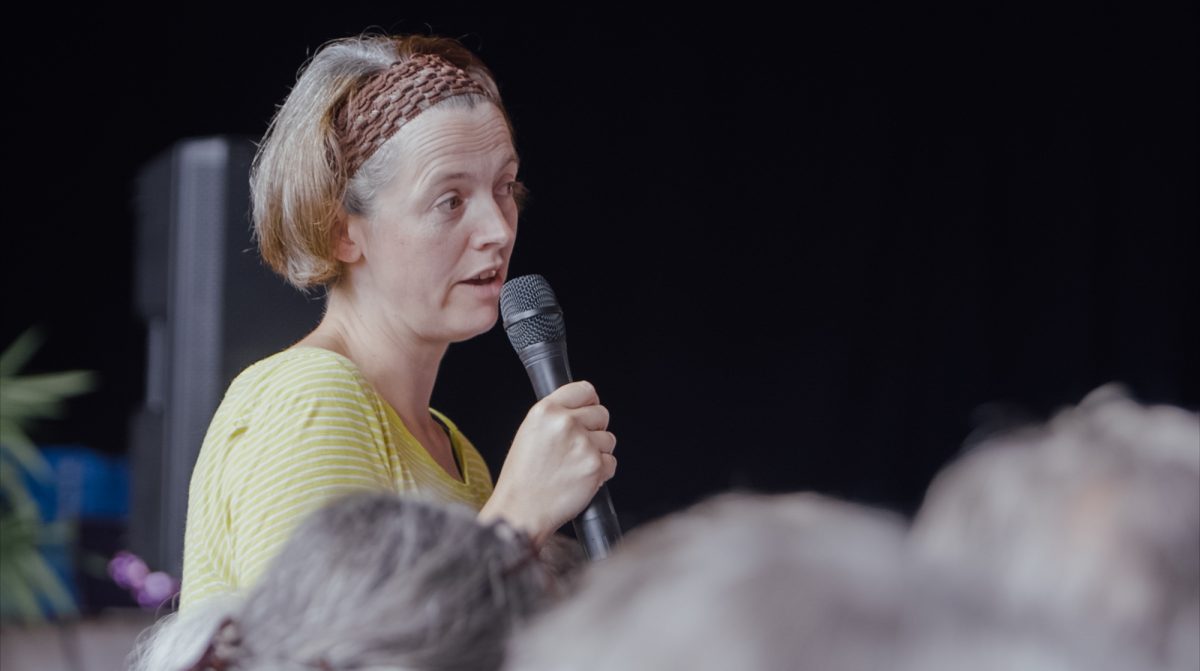
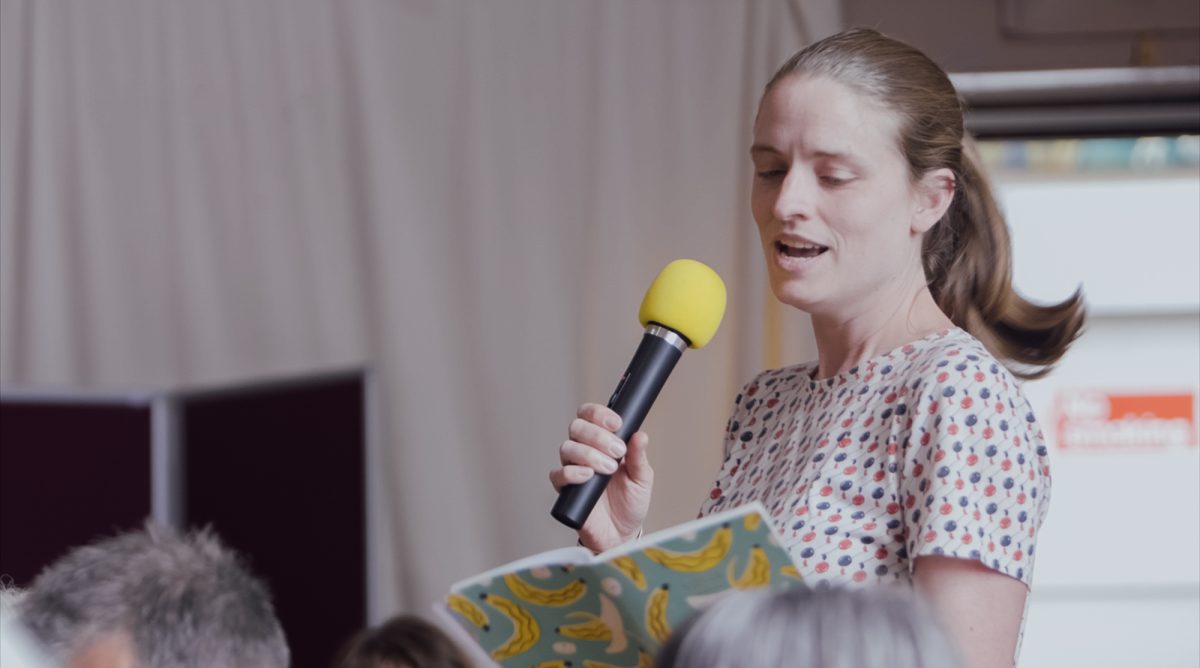
Alice Moseley of Exeter University gave a powerful taste, from 2030, of how democracy might have been re-imagined in this country, with citizens assemblies, deliberative democracy, proportional representation, as well as a heartfelt sense of what that would feel like.
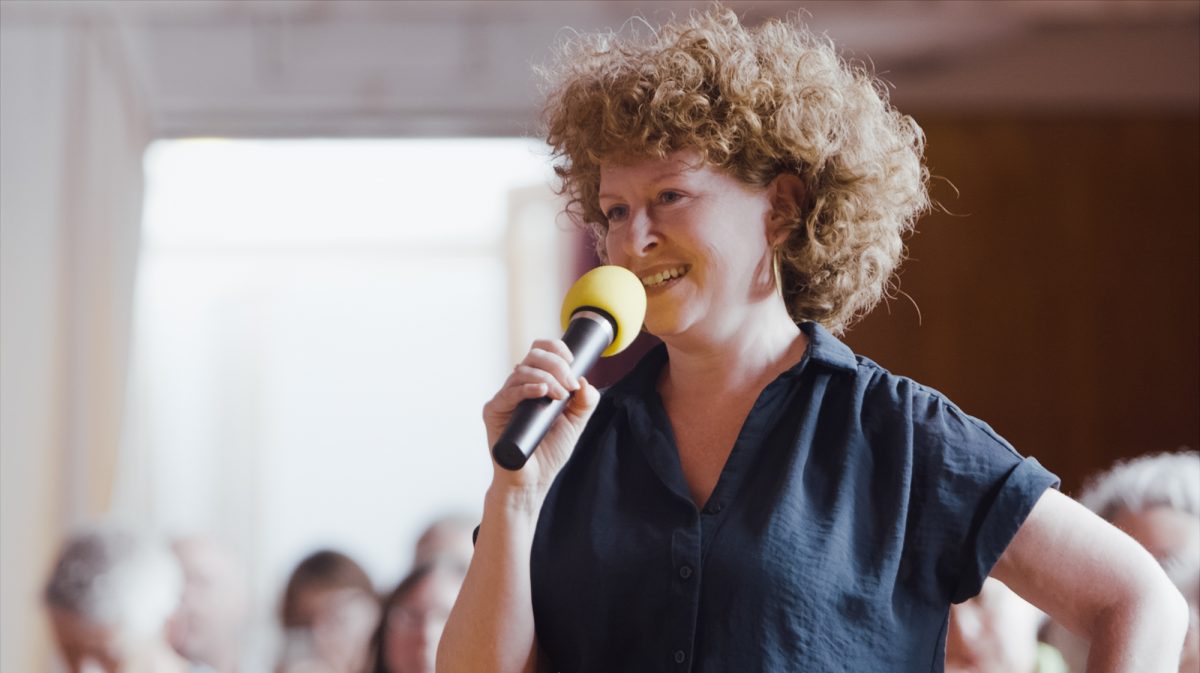
Toni Spencer spoke again, about how a new culture, one that supported people and created a truly human culture, would feel, and what it would look like in our daily lives. Nick spoke movingly about how from his perspective, given the rate of decline we are seeing in terms of water, just having freshwater salmon in our rivers in 10 years would feel like a major success. Harriet closed by listing some of the changes in relation to food, farming and climate that we will need to see over the next 10 years.
Following these provocations, people gathered in small groups to discuss what had moved and affected them. They then worked on their own to identify and highlight the themes that had emerged for them throughout the morning that they felt needed to be reflected in the conversations in the afternoon. These were brought up and stuck on boards at the back of the room.

While everyone then tucked into a delicious lunch, the facilitators condensed and rationalised the responses into 15 key themes for the afternoon, such as transport, food, the role of technology, water, the role of governments, diversity and inclusion, deepening democracy, ownership of resources, welcoming and integrating uprooted people, wildlife and biodiversity and more.
I opened the afternoon by reading a beautiful passage from a speech by Martin Luther King in 1955, shortly after the arrest of Rosa Parks. what is known as the ‘Montgomery Bus Boycott speech’:
“Right here in Montgomery, when the history books are written in the future somebody will have to say, “There lived a race of people a black people … a people who had the moral courage to stand up for their rights. And thereby they injected a new meaning into the veins of history and of civilization.” And we’re gonna do that. God grant that we will do it before it is too late. As we proceed with our program let us think of these things”.
This afternoon, I suggested, is the opportunity for us all to “inject a new meaning into the veins of history and of civilization”, and to think in that way. “Now we are going to hand over to you”, I said. “Together we are going to co–create the contents of a book called a Peoples Climate and Ecological Emergency Plan for Totnes. Our overall question for this afternoon is if we do everything we possibly can do to respond to the climate and ecological emergency, working together locally and thinking globally, if we draw on all the resources, imagination, courage and political will, what could we create?”
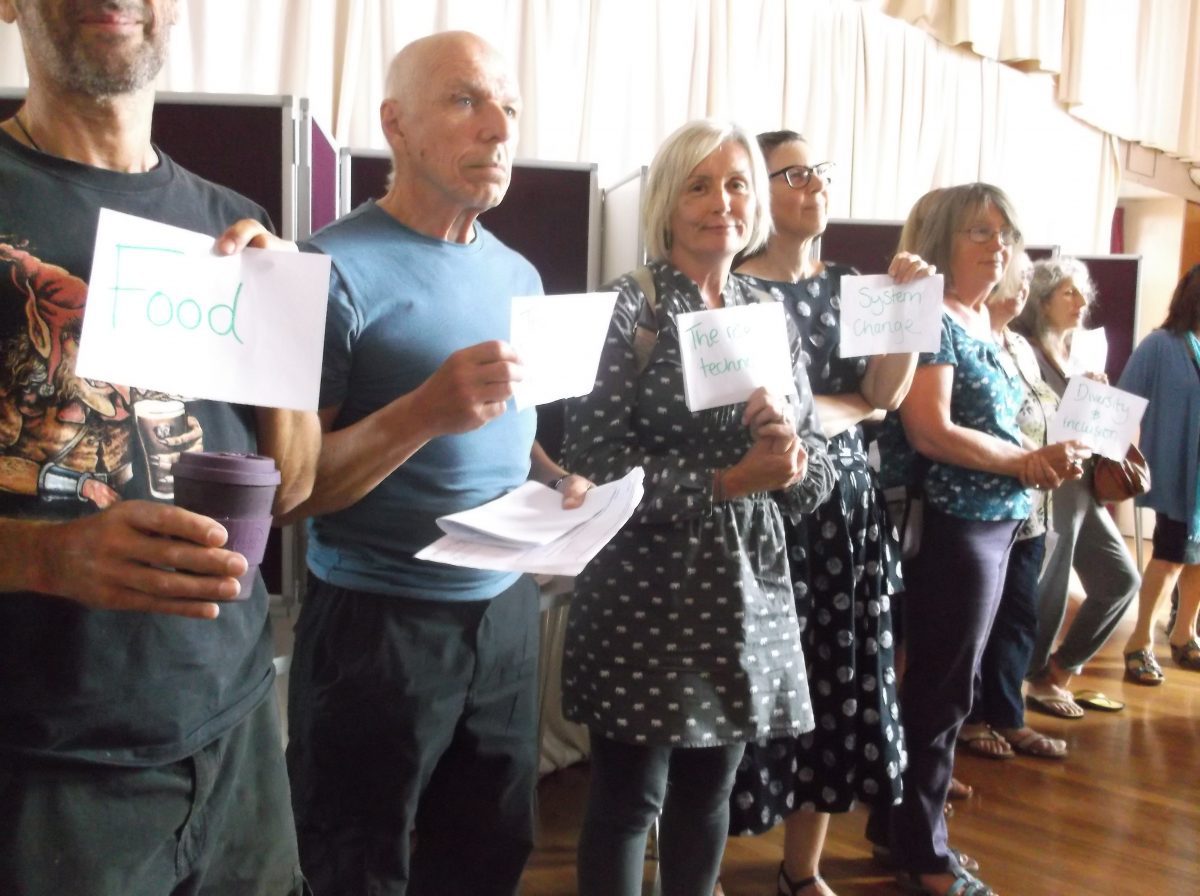
A group of 15 people with experience of facilitation had been briefed as to what we wanted them to do, and then each one was given a different topic. Participants were invited to stand around the edge of the hall (now reconfigured with tables and chairs) and each facilitator went to sit at a table, announced their topic and then sat holding it aloft. We were told that each conversation would be no more than 8 people, and that if there were more than 8 we should create a new table and an ‘overspill’ conversation. People then moved to the table they wanted to be part of, and the conversations began.
Before we got people started we taught them some basic hand signals to aid in the flow and effectiveness of the conversation. The conversations then began in what was meant to be four rounds, but which we condensed into the 3 due to time pressures. But I will give you here the 4 questions we originally intended, and the facilitators notes to give you a sense of the structure and the flow of this part…
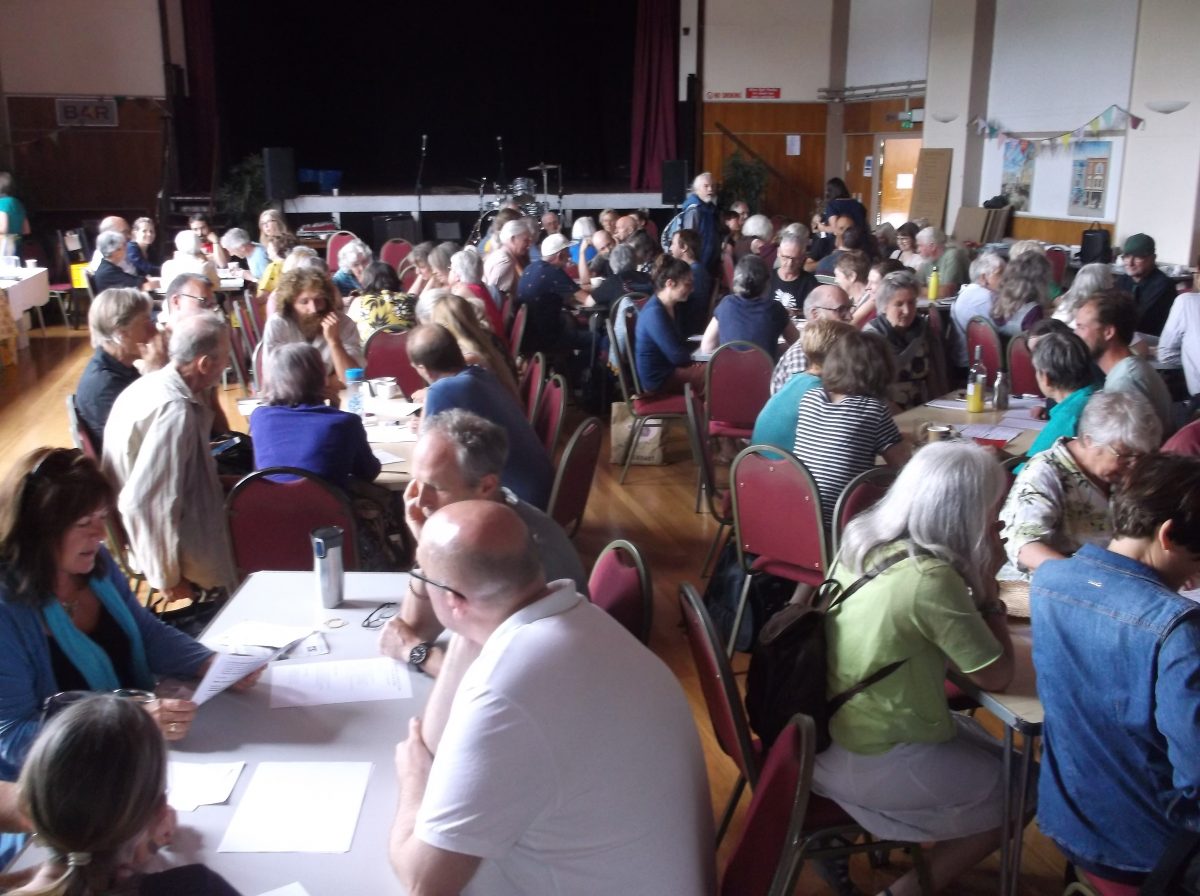
Round One (30 minutes in total)
In relation to your theme. What’s already here in Totnes and Area that we value and want to keep?
(projects, relationships, connections, objects, ways of being or doing)
1) Pop-corn general conversation 20 mins encourage all voices to be heard (give people 5 mins warning)
2) Feedback – work together to agree one or two key points that reflect your conversation. Try to make sure everybody feels this is ‘good enough’ and write this on a piece A5 paper (5 mins)
Let’s hear from a few tables ( 5 mins ) (I wandered around just hearing one point from a few tables)
Round Two (30 minutes in total).
In relation to your theme. What doesn’t serve us anymore? What do we need to let go of? (i.e. ways of doing, being, thinking, working, consuming, projects and initiatives, resources and materials)
1) Pop-corn general conversation 20 mins encourage all voices to be heard.
2) Feedback –work together to agree one or two key points that reflect your conversation. Try to make sure everybody feels this is ‘good enough’ and write this on a piece A5 paper (5 mins)
Let’s hear from a few more tables (5 mins)
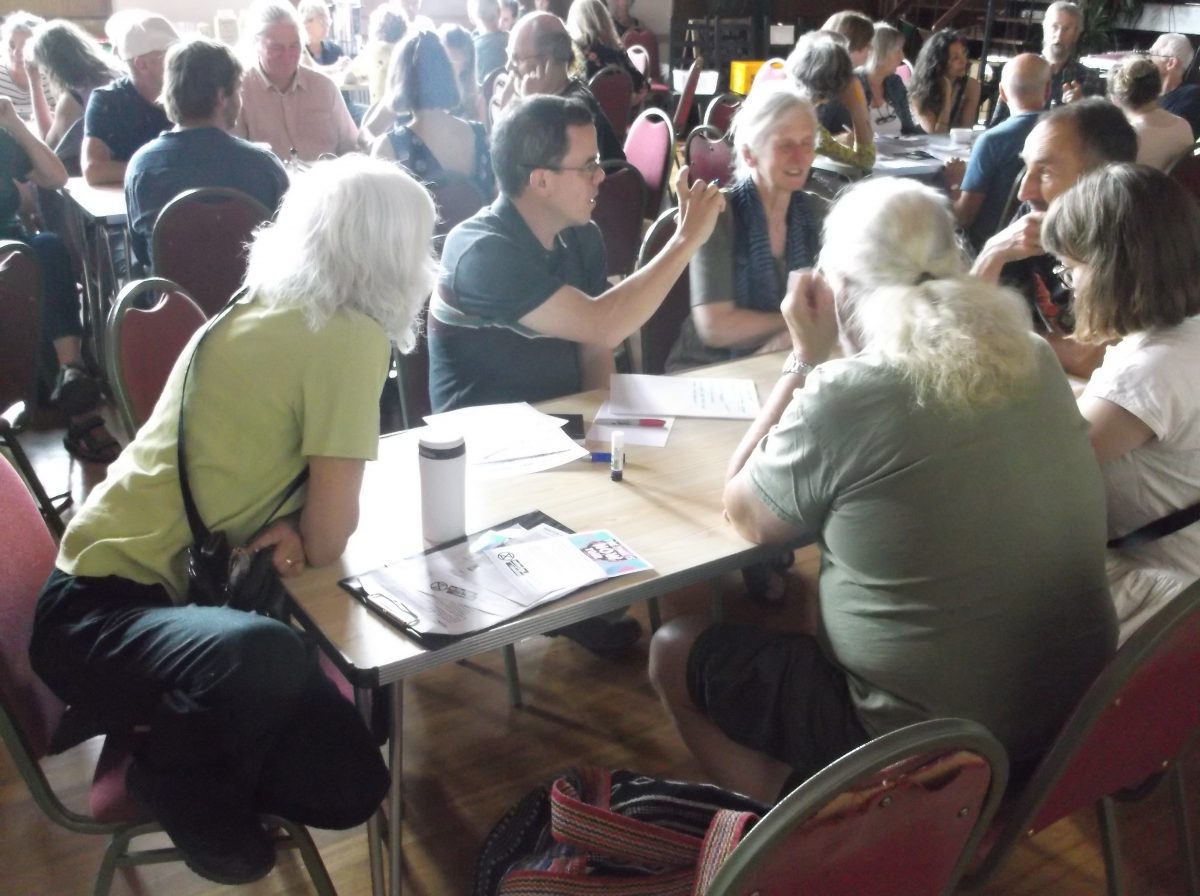
Round Three (30 minutes in total)
In relation to your theme, what else do we need or what’s missing? What do we need to repair, restore or create? (think about connections, relationships, understanding, ways of being and doing,for now and the future)
1) Go round the group, everybody gives a personal response to the question. 1 minute each
2) Pop-corn general conversation 20 mins encourage all voices to be heard.
3) Feedback –work together to agree one or two key points that reflect your conversation. Try to make sure everybody feels this is ‘good enough’ and write this on a piece A5 paper (5 mins )
Let’s hear from a few more tables (5 mins)
Then, after a very short break and a stretch…
Round Four (30 minutes)
In relation to your theme, what are the NEXT steps in responding to the climate and ecological emergency? Pop corn conversation for each sphere of influence below
- For decision makers – parish, town, district council – 6 mins
- As citizens collectively with other towns cities and places in our region? – 6 mins
- In our community groups/communities of interest and Totnes as a whole? – 6 mins
- With our neighbours, friends, family, personally – 6 mins
Feedback –work together to agree 4 key next steps to share with the wider group that reflect your conversation. Try to make sure everybody feels this is ‘good enough’ and write this on a piece A5 paper (5 mins)
The ensuing conversations were lively and focused. Then the whole day was pulled together in a mad flurry, where every table was given large sheets of cardboard and glue and scissors and invited to paste their ideas onto the page in the order of the conversation so that we had pages for our book.
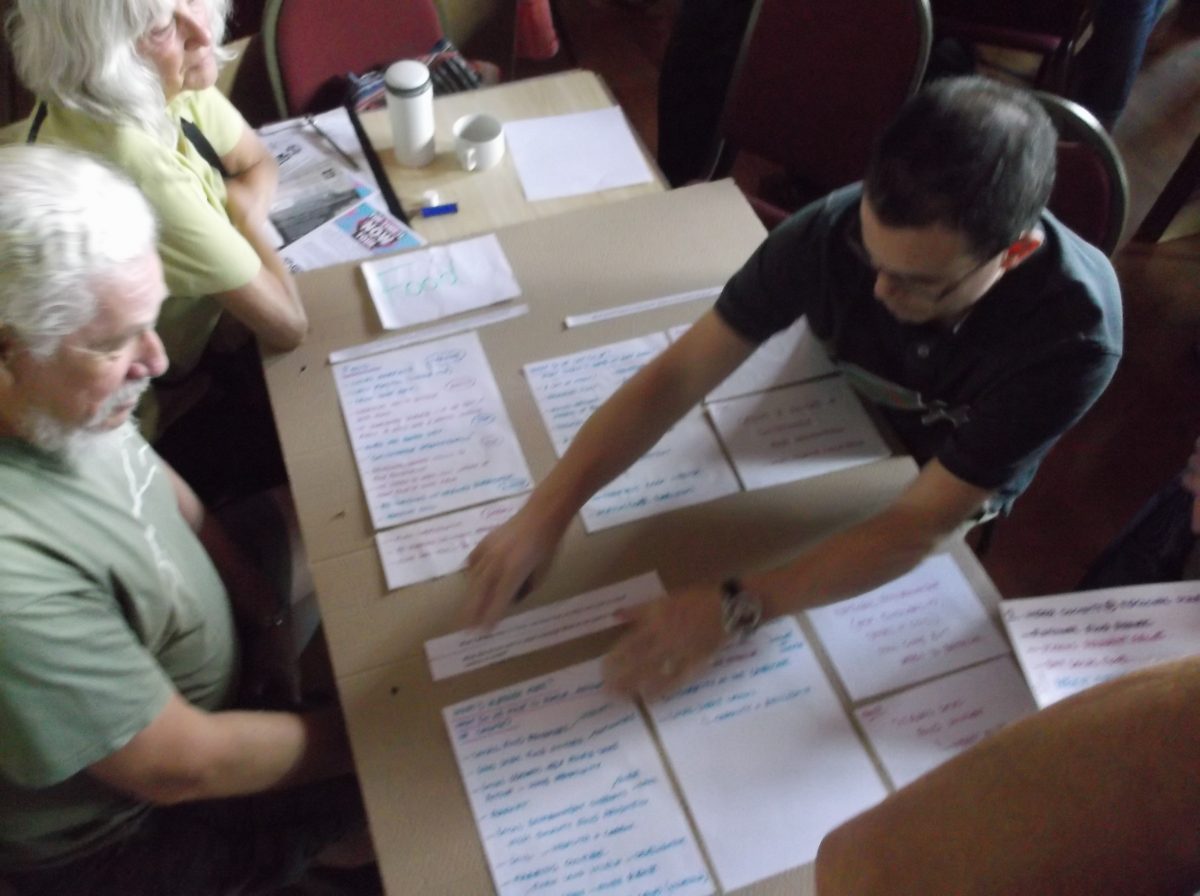
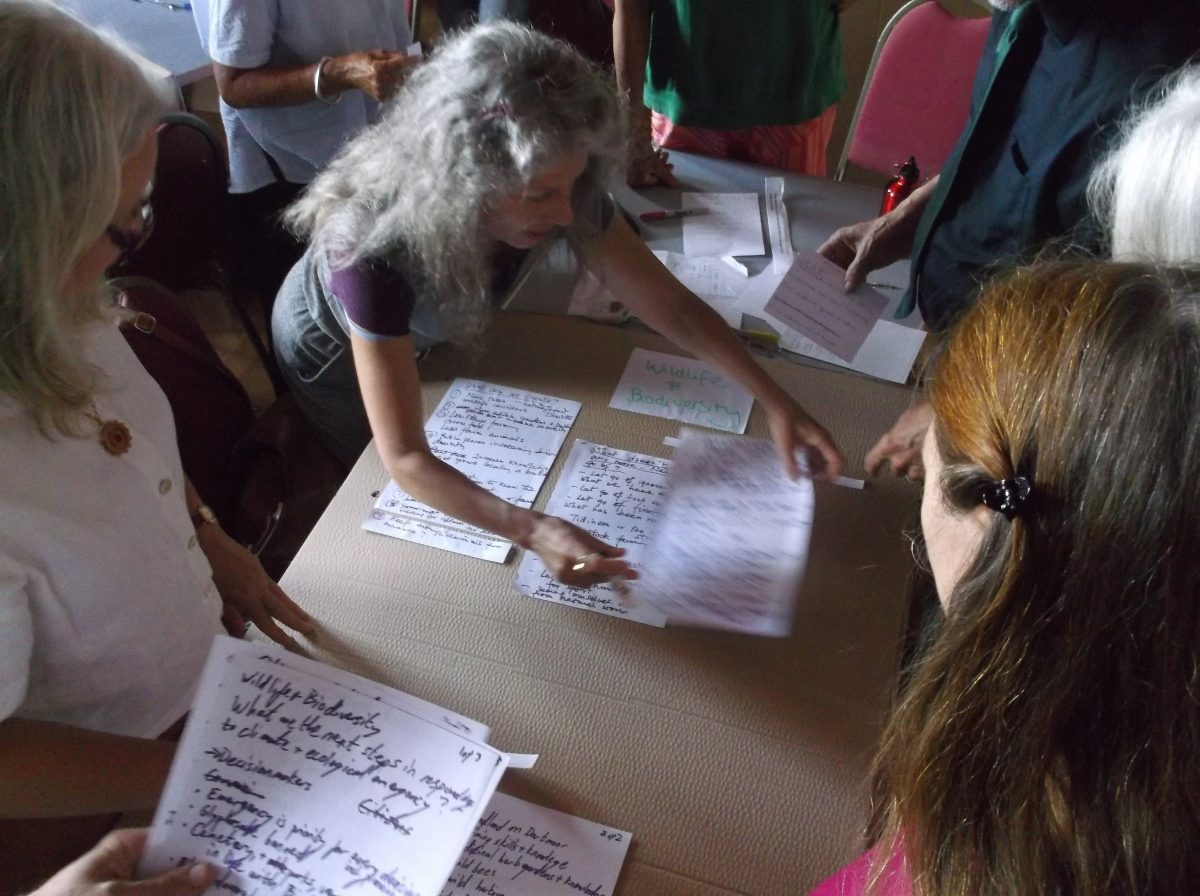
Once this was done, which took less time than you might imagine (!), the room was rearranged and while the book was being assembled, formed into a circle with a space in the middle. Once complete, with due ceremony, the book was brought in to applause and cheering. We all gathered around for a group photo with the fruits of our labours, and that was that.
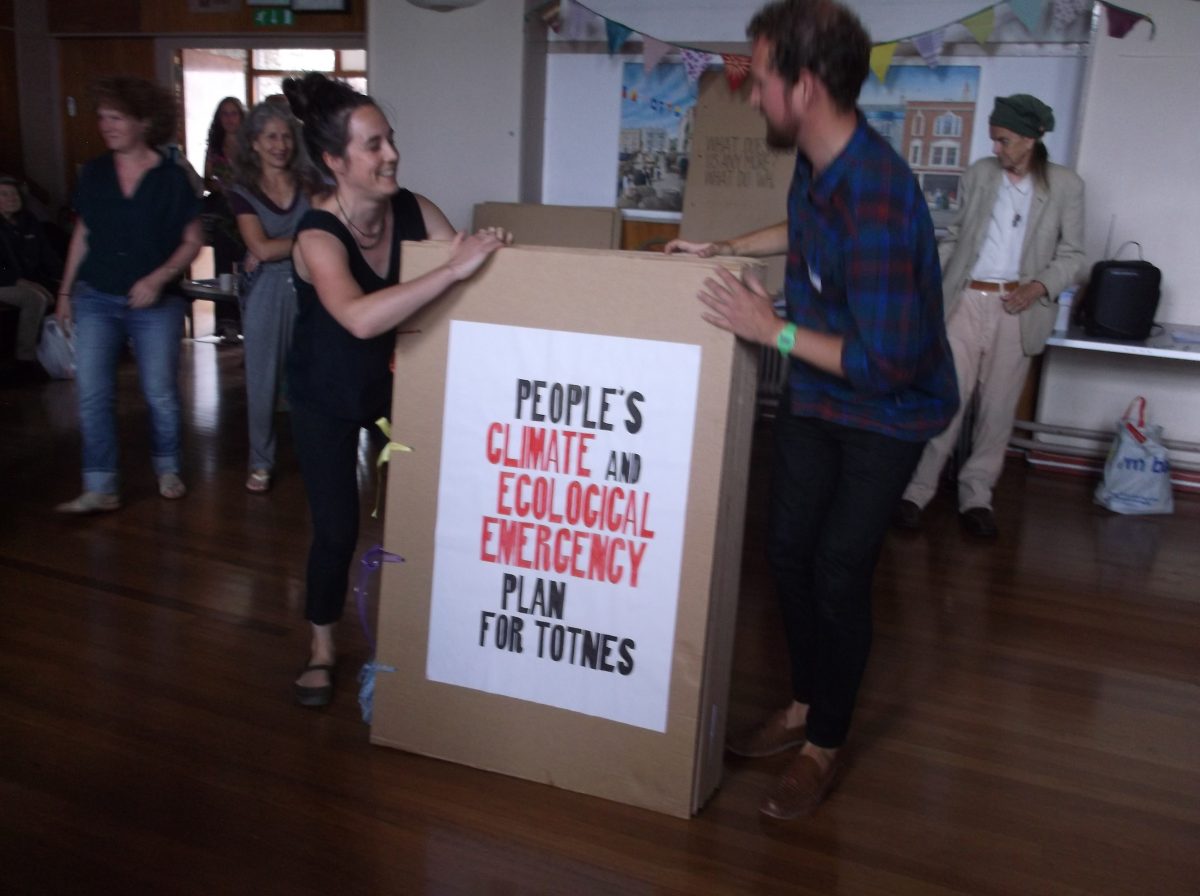
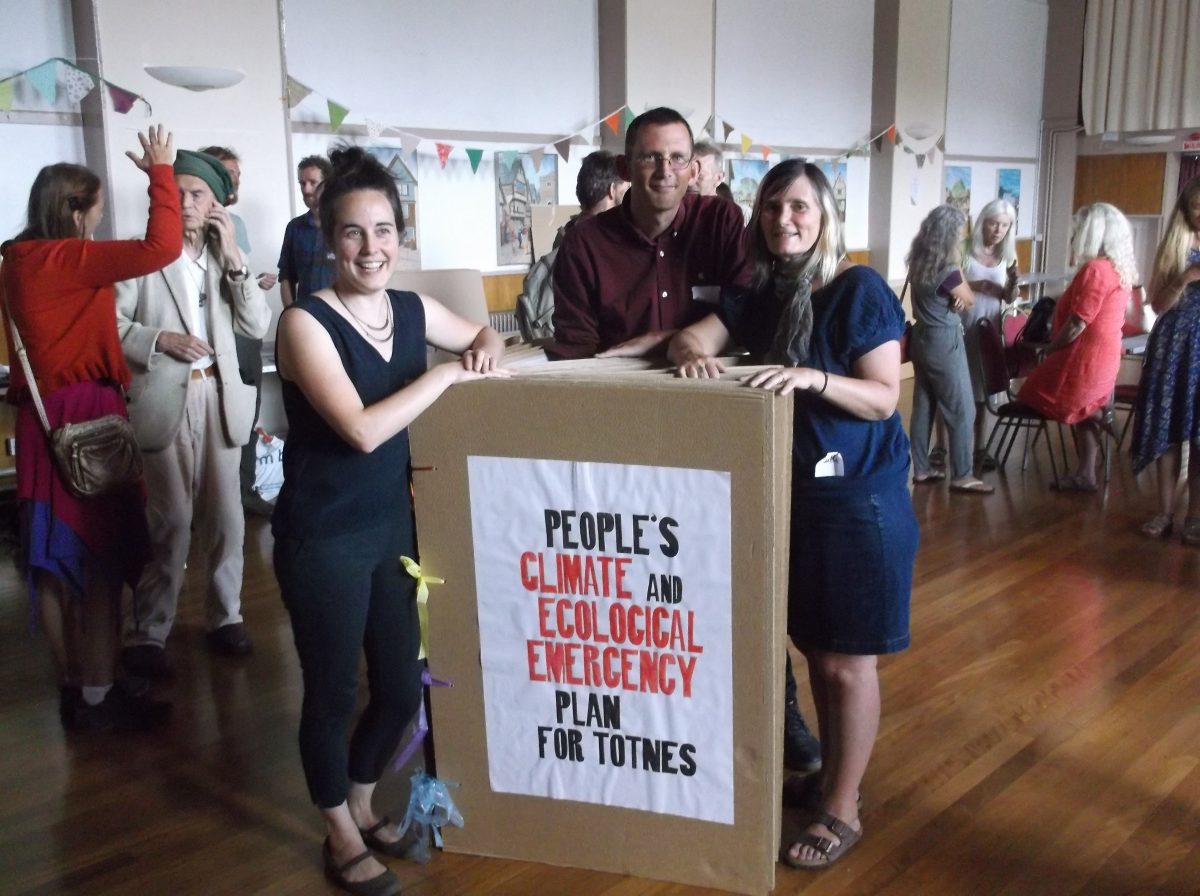
The bar then opened, local young musicians (Kuki and the Bard, Lily and Booshka) came and played, conversation flowed. It was a delightful end to a fascinating day. For me, the design of the day worked really well. It created a safe space at the beginning which allowed us to sit with the despair and the hopelessness of the situation, and then moved into the ‘what if’ space, of what might actually be possible if we decide that that’s what needs to happen and act upon it.
I have rarely been to events that straddle that polarity, that sit in all places along that spectrum. It was deeply moving, spoke from the heart, told the truth, while also being deeply purposeful and intentional about where we want to go next. It was also very playful, with the big book, the choosing of objects. It was also very connecting, with lots of conversations with people many of whom may have been strangers before the event.
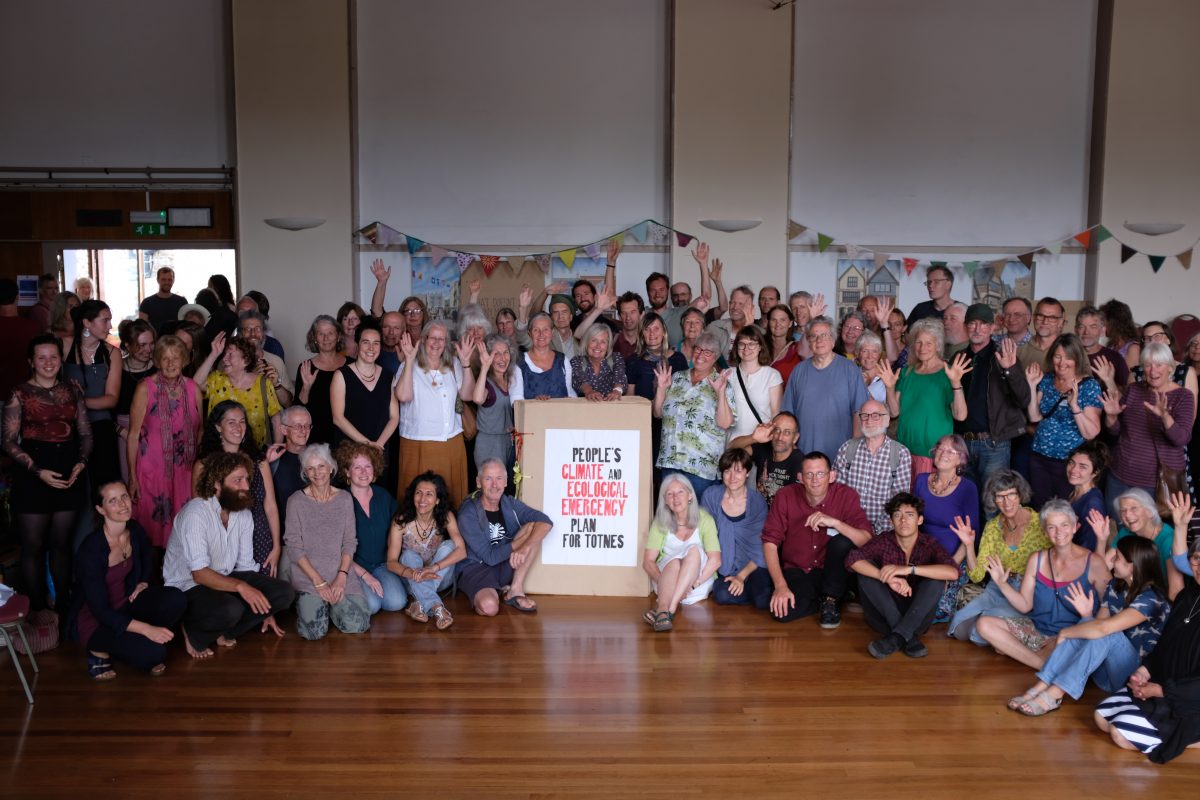
This Totnes event was only possible because of the many people who came together to make it a reality. The content group who planned and designed the day was Jacqi Hodgson, Thea Platt, Emma Hopkins, Ruth Ben-Tovim, Jenny Gellatly, Mary Coughlan-Clarke, Sylvia Dell, Claire Alford, Anna Lopez, Rob Hopkins.
Thanks to all our amazing provocateurs, to our MP Dr. Sarah Wollaston who attended the morning as a ‘keynote listener’, to the music team Will Benzies, Beth Bee-Love and Rowland O’Connor, Sarah Parker and all our wonderful musicians Kuki and the Bard, Lily and Che and Booshka. To the facilitators, Ruth Ben Tovim and Rob Hopkins and their co-facilitators, Jenny Gellatly and Rob Shorter. Thank you also to all our amazing provocateurs. Thanks to everyone who helped on the day, those who set up and cleared up (for some hours!), to all the food angels, co-ordinated by Emma Hopkins, who cooked and prepared food for the day and those that sustained us keeping us fed and watered. Thanks to Emil Walker, Mike Jones and Rob Hopkins for the photos above.
Thanks finally to Riverford, Ben’s Wine and Tapas, Greenlife, The Kitchen Table, Food in Community, Almond Thief Bakery, New Lion Brewery, Ben’s Farm Shops and Schumacher College for their generous donations to the food and the bar.
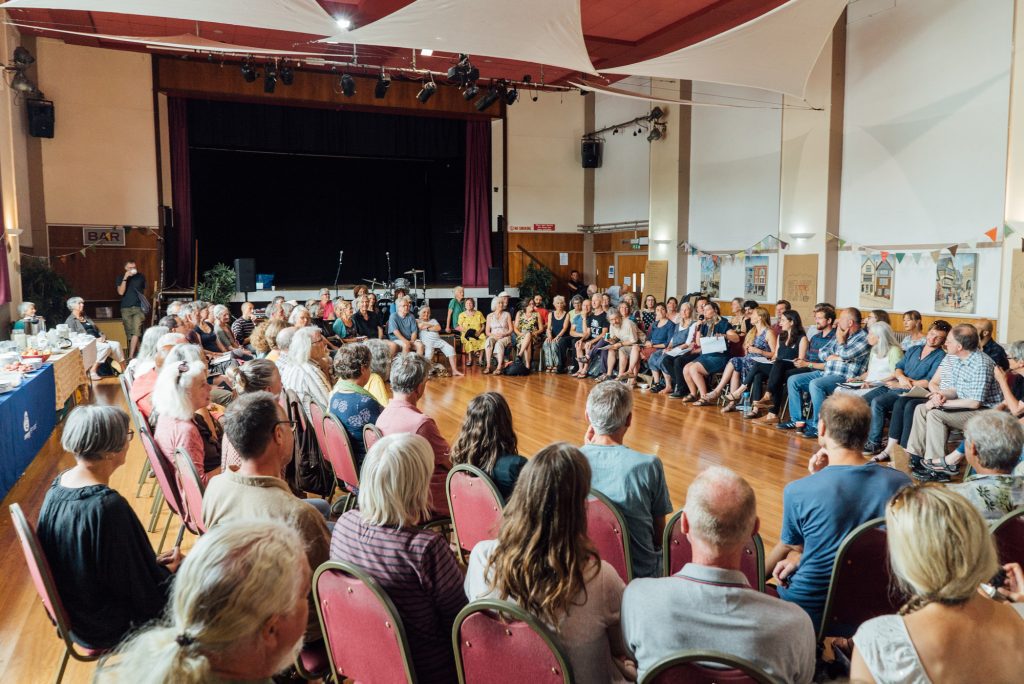
2 Comments
Hi Rob,
thank you very much for your inspiring report and for the facilitating guide. I would be very interested to know who takes care of the results. What happened with the book? And what are next steps after the event?
Best
Gesa
Amazing process, very inspiring, such a great answer to create the great turning we are willing for. I hope to experiment it one day with the people where i live.
Thx
Noémie (Swiss Hub)